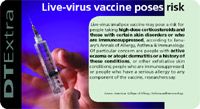- Acne
- Actinic Keratosis
- Aesthetics
- Alopecia
- Atopic Dermatitis
- Buy-and-Bill
- COVID-19
- Case-Based Roundtable
- Chronic Hand Eczema
- Chronic Spontaneous Urticaria
- Drug Watch
- Eczema
- General Dermatology
- Hidradenitis Suppurativa
- Melasma
- NP and PA
- Pediatric Dermatology
- Pigmentary Disorders
- Practice Management
- Precision Medicine and Biologics
- Prurigo Nodularis
- Psoriasis
- Psoriatic Arthritis
- Rare Disease
- Rosacea
- Skin Cancer
- Vitiligo
- Wound Care
Article
Psoriasis breakthrough
Leicester, U.K. — New research by a British team indicates that people with psoriasis are more likely to have a variant of the corneodesmosin (CDSN) gene. Furthermore, this CDSN variant behaves differently than does a corresponding gene more frequently seen in healthy people.

According to lead investigator Richard Trembath, M.D., Ph.D., "As genetics plays an important part in determining who will, or for that matter, will not develop psoriasis, scientists have been studying the genetic basis of the condition for some time. Most of the focus has been on the immune side of the regulation of response."
Dr. Trembath is professor of medical genetics at the University of Leicester.
But questions remained: How did variation alter the functioning of CDSN molecules and predispose individuals to psoriasis?
Now a paper presented by Dr. Trembath and colleagues (Human Molecular Genetics, 2004, Vol.13, No. 20) proves that CDSN alters the longevity and functioning of an RNA transcript, which causes an accumulation of CDSN protein, which leads to the familiar psoriatic inflammatory response when predisposed individuals are exposed to environmental triggers that might include bacterial infections or stress.
Better treatments"Attempts to modulate RNA stability have been the subject of substantial, and more general, research effort," Dr. Trembath says. "Our results will allow for rapid lab screens of a large number of compounds that might influence transcript stability and potentially lead to new therapeutic options for psoriasis."
Research methodologyHe adds, "I'm not saying a new treatment is just around the corner, but that these types of studies are now warranted with the goal of producing specific and safe treatments."The U.K. team began with blood samples from patients with psoriasis and unaffected controls, examining the frequency of variants of the corneodesmosin gene and determining which were highly significant. Next, in a test tube, they assessed each variant's capacity for producing the CDSN protein.
Because the protein is difficult to study directly, they used an intermediary, comparing the decay rate of RNAs transcripted from risk-bearing and neutral haplotypes. Two independent transfection experiments showed that the relative stability of the former was almost twice the latter. These results were confirmed by northern blot analysis.
"We also looked at skin cells growing in the lab and saw the same effect," Dr. Trembath says.
But what CDSN variant(s) accounted for the increase in RNA stability? Researchers used site-directed mutagenesis to modify nucleotides in the risk-bearing haplotypes. The substitution of nucleotide 1625 did not affect relative RNA stability; however, nucleotide 971 reduced stability by 50 percent. This finding was also confirmed by northern blot analysis.
What scientists showedIn short, the scientists showed that the variant CDSN*971T confers abnormal RNA stability to transcripts. They also observed an over-expression of haplotypes bearing CDSN*971T in a spontaneously immortalized HaCaT keratinocyte cell line.
Because analysis was limited to a small gene-coding region, it is possible that other gene variants are contributing to the up-regulation of corneodesmosin. Amino acid substitutions could also contribute to the pathogenesis of the disease, once the protein has been translated.
In the next research phase, Dr. Trembath says he hopes to illustrate how CDSN behaves when exposed to environmental triggers.
Newsletter
Like what you’re reading? Subscribe to Dermatology Times for weekly updates on therapies, innovations, and real-world practice tips.











